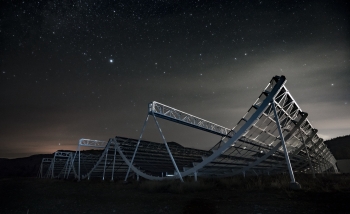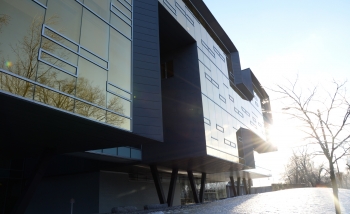CHIME Fast Radio Burst team to receive 2022 Berkeley Prize
The Canadian Hydrogen Intensity Mapping Experiment fast radio burst (CHIME/FRB) team, which discovered more than 500 new fast radio bursts in the first year of the detector’s operations, will receive the 2022 Lancelot M. Berkeley − New York Community Trust Prize for Meritorious Work in Astronomy.
Bestowed annually since 2011 by the American Astronomical Society (AAS) and supported by a grant from the New York Community Trust, the Berkeley Prize includes a monetary award and an invitation to give the closing plenary lecture at the AAS winter meeting in January 2022.
The CHIME/FRB team is being honoured with the 2022 Berkeley Prize for its dramatic progress on fast radio bursts – brief and powerful flashes of radio waves with enigmatic origins – using observations from the CHIME radio telescope in British Columbia. Though fast radio bursts were discovered in 2007, only about 140 of them had been found until recently. During the past year, the CHIME/FRB team has presented detections that more than quadruple that number.
Though originally designed for other cosmological studies, CHIME has become the world’s most successful FRB hunter, thanks in large part to software developed by a team led by Kendrick Smith, who holds the Daniel Family James Peebles Chair in Theoretical Physics at Perimeter.
The sources of fast radio bursts have long eluded astronomers. With CHIME’s new detections – which include bursts from 18 repeating sources – the amount of data available to characterize these mysterious bursts has grown significantly. CHIME’s observations of the bursts and their distribution on the sky have substantially advanced our understanding of these sources.
Each year, the three AAS Vice-Presidents, in consultation with the Editor-in-Chief of the AAS journals, select the Berkeley Prize winner for meritorious research published within the preceding 12 months. The CHIME/FRB team is recognized in particular for an article published in Nature in November 2020 that identified the first known fast radio burst within our own galaxy and tied this flash to its potential source, a known magnetar in the Milky Way. This work has shown that at least some fast radio bursts may originate from young, active magnetars – highly magnetized and dense remnants of massive stars.
Smith says the CHIME telescope will soon become significantly more powerful when two “outrigger” telescopes – one in California, the other in West Virginia – come online, allowing researchers to triangulate the location of FRBs roughly 1,000 times more precisely.
“CHIME is currently the most powerful telescope in the world at finding FRBs, but we usually can’t pinpoint them accurately enough to identify a specific host galaxy,” said Smith. “When an FRB goes off, we’ll be able to pinpoint the galaxy it’s in, and even which part of the galaxy.”
Plans are also underway for the construction of the CHORD Telescope (Canadian Hydrogen Observatory and Radio-transient Detector) over the next several years, which will be adjacent to (and roughly eight times more powerful than) CHIME.
Perimeter Director Robert Myers said the CHIME project is a “uniquely Canadian success story and an inspiring example of scientific ingenuity and collaboration.”
“I am particularly proud of the pivotal role which the Perimeter team played in the success of CHIME, which has vaulted Canada to the forefront of radio astronomy. The CHIME collaboration has opened new pathways for radio astronomy and the fundamental study of our universe,” said Myers. “The Berkeley award is well-deserved recognition of their brilliant, innovative approaches.”
Further exploration
About PI
Perimeter Institute is the world’s largest research hub devoted to theoretical physics. The independent Institute was founded in 1999 to foster breakthroughs in the fundamental understanding of our universe, from the smallest particles to the entire cosmos. Research at Perimeter is motivated by the understanding that fundamental science advances human knowledge and catalyzes innovation, and that today’s theoretical physics is tomorrow’s technology. Located in the Region of Waterloo, the not-for-profit Institute is a unique public-private endeavour, including the Governments of Ontario and Canada, that enables cutting-edge research, trains the next generation of scientific pioneers, and shares the power of physics through award-winning educational outreach and public engagement.



